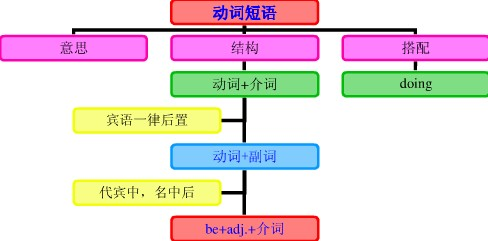本试题 “Rubbish _____ to give light after this kind of new machine is invented.A. will be made useB. will make use ofC. will be used ofD. will be made use of” 主要考查您对动词短语
一般将来时的被动语态
等考点的理解。关于这些考点您可以点击下面的选项卡查看详细档案。
- 动词短语
- 一般将来时的被动语态
动词短语的概念:
动词常和某些其他词类用在一起,构成固定词组,形成所谓短语动词(phrasalverb)。和动词一样,短语动词也可分为及物和不及物两种。短语动词可以作为一个整体看待,同一般动词一样使用。
动词短语的搭配类型:
1)动词+介词:这类短语动词用作及物动词,后面须跟宾语。
如:The small boy insisted on going with his parents. 那男孩坚持要跟父母一起去。
Do you often listen to broadcasts in English? 你常听英语广播吗?
Look at the children. Aren't they lovely? 看着这些孩子们。他们多么可爱呀!
We stand for self-reliance. 我们是主张自力更生的。
这一类的短语动词还有很多,如depend on(upon)(依靠),wait on(服侍),look for(寻找),deal with(对待),look after(照料),wait for(等待)等。
2)动词+副词:
这类短语动词有的用作及物动词,有的用作不及物动词。
如:I always get up as soon as the bell rings. 我总是一打铃就起床。(不及物)
Look out, there's a car coming! 当心,来汽车了!(不及物)
Have you handed in your exercises already? 你已经交练习了吗?(及物)
Please don't forget to put on your coat, it's cold outside. 请不要忘记穿外衣,外面很冷。(及物)
这一类的短语动词还有很多,及物如put out(扑灭),eat up(吃光),put down(放下);不及物如set off(出发),come up(走近),go on(继续)。
注:"动词+副词"这类短语动词和上面第一类"动词+介词"的不同之处在于:"动词+介词"用作及物动词,后面须跟宾语。"动词+副词"则有的及物,有的不及物;用作及物动词而宾语为人称代词或自身代词时,副词往往放在宾语之后。
如:Please wake me up at five tomorrow. 请在明天早上五点唤醒我。
If you have done your exercises, please hand them in. 如果你们练习做完了请交来。
She doesn't normally behave like that, she's putting it on. 她通常并不如此表现,她是装出来的。
注:这类短语动词有不少可兼作及物和不及物动词用。
如:He took off his hat when he entered the office. 他进办公室后脱下帽子。(及物)
The plane took off at seven sharp. 飞机在七点整起飞。(不及物)
Charlie rang up Neil to ask about the time of the meeting. 查理打电话给尼尔问开会的时间。(及物)
If you can't come, please ring up and let us know. 你如来不了,请来电话告诉我们一声。(不及物)
3)动词+副词+介词:
"动词+副词"之后有的可以再加一个介词,形成另一种短语动词。这类短语动词用作及物动词。
如:Do not give up hope. We must go on with the experiment 不要失望。我们必须继续试验。(go on with继续)
He came up to me. 他走到我跟前。(come up to走近)
这类短语动词还有:look down upon(看不起),do away with(去掉),put up with(忍受)等。
4)动词+名词+介词:
这类短语动词也是及物的。
如:He shook hands with all the guests at the banquet. 他在宴会上和宾客一一握手。
Young pioneers often come to the Children's Palace to take part in after school activities.少先队员经常到少年宫来参加课外活动。
Pay attention to the temperature of the stored rice. 注意仓库里的稻谷的温度。
Her job is taking care of the babies. 她的工作是照顾婴儿。
这一类短语动词还有:put an end to(结束),take notice of(注意),catch hold of(抓住),lose sight of(看不见),make use of(利用)等。
动词短语知识体系:

一般将来时的被动语态:
表示将来要发生的动作和存在的状况且主语是动作的承受着。由shall/will be+done构成。
一般将来时态的被动语态的基本结构的构成:
1、一般将来时态的被动语态的肯定式为:shall/will+be+done。(shall用于第一人称; will用于各种人称)
如:We shall be punished if we break the rule. 如果我们违反规定,我们将要受到惩罚。
The new film will be shown next Thursday. 这部新电影将在下周四上映。
2、一般将来时态的被动语态的否定式为:shall/will+not+be+done.(可缩写成shan't 或won't)
如:The meeting won't be held tomorrow. 明天不再举行会议。
The exhibition won't be put off till next week. 展览会将不会推迟到下周。
3、一般将来时态的被动语态的一般疑问句需将shall/will提到主语的前面。(回答用yes或no)
如:Won't water be turned into ice, if it is below freezing? 如果气温在冰点之下,水难道不会变成冰吗?
—Will the work be finished at once? 这项工作会立刻被完成吗?
—Yes, it will. ?是的,立刻就完成。
4、一般将来时态的被动语态的特殊疑问句为:疑问词+shall/will+S+be+done。
如:When will these books be published? 这些书将在什么时候被出版?
Whom will this book be written by? 谁来写这本书?
一般将来时态的被动语态的其他结构构成:
1、be going to be done:
如:Some old buildings are going to be put down. 一些旧的楼房将被推倒。
The problem isn't going to be discussed at the meeting tomorrow. 这个问题将不在明天的会议上被讨论。
—Arethesetreesgoingtobecutdown?这些树将被砍倒吗?
—Yes,they are. 是的,将被砍倒
2、be to be done:
如:The sports meet is to be held on April10. 运动会将于四月十日举行。
The machines are not to be repaired tonight. 今晚将不会修理这些机器。
—Are new textbooks to be published next week?新教科书将在下周出版吗?
—No, they aren't. 不,不是。
一般将来时态的被动语态的用法:
1、一般将来时态的被动语态的同它的主动语态一样,强调表示根据计划或安排将要发生的被动性动作。
如:The new film will be shown next Thursday. 这部新电影将在下周四上映。
A lot of athletes will be invited to Beijing. 好多运动员将被邀请到北京来。
2、在时间、条件状语从句中,常用一般现在时的被动语态代替一般将来时的被动语态。
如:When the dam is completed, the Changjiang River will be controlled. 当大坝竣工时,长江将得到控制。
If I am given enough time, I will go to Japan for my holiday. 如果我有足够的时间,我将去日本度假。
3、表示有固定性条件就有规律性被动结果。
如:Heated to100℃, water will be turned into steam. 加热到100度时,水将会变成蒸气。
If you speak in class, you will be punished. 如果你在课堂上讲话,你将会被惩罚。
发现相似题
与“Rubbish _____ to give light after this kind of new machin...”考查相似的试题有:
- What you said is reasonable, so I agree with you______.A.in a wayB.in the wayC.by the wayD.on the way
- The computer system ________ suddenly while he was searching for information on the Internet .[ ]A. broke downB. brok...
- — Should I talk to you in English or French? — Do as you ________ . We understand both.A.thinkB.feel likeC.careD....
- The teacher stressed again that the students should not _____ any important details while retelling thestory.[ ]A. br...
- We know from their greetings how much they expect _____ us. We won't let them down.[ ]A. ofB. onC. forD. to
- After Mary and Caroline covered 25 kilometers that day, their legs________.[ ]A. gave inB. gave offC. gave outD. gave...
- Some policemen were sent there to ______ the villagers ______ down the trees.A.keep;cuttingB.prevent;cuttingC.prev...
- French _________ English _________ having gender(性的区别) for all nouns.A.different from; inB.is different; fromC...
- "I ______ poetry as the food of the love," said Darcy.A.have been used to consideringB.have used to considerC.use ...
- — to the sun, the flowers will become dry soon.— What you said does make .[ ]A. Exposed; senseB. Exposing; senseC. Ex...